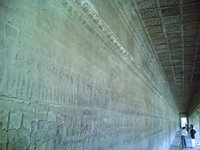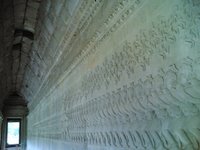
TIME FOR SOME LETTERS
Hola.
Let's pause for some letters from readers. Some are about pieces I wrote commemorating the anniversary of martial rule in the Philippines; others are about blog posts. I've chosen a few of the more interesting, and they range from incensed, to glad, and suggestions of new themes. One letter even added new names to my already long name -- Genghis, arsonist, Evita. To the interesting ones I've included some of my replies, just so the exchanges have some sort of frame.
So scroll down if you have nothing better to do. My replies (explanations to maintain the flow) are in italics.
Here's one from an irate Joe Reyes of New York who was evidently worked up by the article The Vein of Thirty-Four Years, which includes a couple of exchanges:
Hi Red Constantino and Caesar,
Red and Caesar should not be blue wallowing in the sicknesses of the past or present. Let us have bright red thoughts in our pulsing cranial arteries (if there are such things--I don't know, I am only a silly puitic poet.)
We all know that life is no longer a Newtonian universe with three dimensions or an Einsteinian one with four. Rather it appears that there are millions or trillions of parallel universes existing in 11 dimensions, according to the latest String Theory on the Physics of the world.
As in physics, so too in a nation's life: there are many realities--some productive and others futile and defeated, like the Blue Constantino reality.
The Philippine reality is that when Marcos instituted martial law and American businessmen cheered, the economy prospered for eight years only to collapse during 1983/85, hit by high oil prices, and by Typhoon Imelda, and by the impact of a Tsunami known as the inefficient Philippine industrialization plan. Since 1953, the so-called Filipino "nationalist" industrialists had not been export-oriented, had not been earning dollars and had been bleeding the country dry of dollars to spend on imported components that were assembled into globally-unsalable, inferior products serving only the local markets.
The industrialists survived only with the high tariffs that the left applauded as a barrier against imperialism. Since the industrialists were highly protected, these "nationalists" exploited local consumers with high prices. Since they served only the tiny Philippine market, these nationalists had small sales and could not create all that many jobs to enrich workers. Since these nationalists earned no dollars and no big profits, they could not import lots of machines and technologies to help the country.
By contrast, the "non-nationalist(!?)" planners in Hong Kong and Singapore had free markets that left local entrepreneurs unprotected. That forced the entrepreneurs to be globally competitive and to ally with technologically advanced, globally-efficent multinationals.
The alliances built big factories to conquer world markets and soon employed every worker, resulting in labor shortages and high earnings for workers.
The big factories earned big sales and profits to build even larger factories, raise worker productivity, raise their wages, and enrich them and the capitalists--local and multinational--all together.
How wonderful for all classes was non-nationalism, which killed the class struggle and got imperialized synthesized with imperialists in a wonderful dialectic!
Typhoon Imelda was like Nero fiddling while Rome burned. She had no productive ideas in her head but was spending money like crazy amidst the poverty.
But, who were the arsonists?
The biggest arsonists were the "nationalist" Filipino businessmen whose exports were tiny, growing 8% annually (doubling every 9 years) while those of Singapore, Hong Kong, S Korea, and Taiwan were soaring 18% to 30% annually (doubling every 2.4 years to 4 years). Thus, Filipinos missed out on big dollar earnings. The problem got just worse and worse. Now Hong Kong, Singapore, Taiwan and S. Korea have $1.1 trillion of exports of goods and services, or nearly 25 times as high as the $46 billion of the Philippines. Yet, their combined population of only 82 million is lower than the 88 million in the Philippines. No wonder they got ruby-red rich--they had all the dollars needed to import the machines they needed to build factories and laboratories and great universities, and create high-income jobs, and advance at science and technology, and prosper.
Meanwhile a blue Philippines lacked water systems, power plants, telecom networks, modern ports and roads, railways, and factories and jobs, and wallowed in the oxygen-deprived blue bloods of Filipino veins.
The second group of arsonists were ordinary citizens and the best and brightest Filipino intellectuals such as ceasar1185@aol.com (who has forwarded Constantino's email) and Diokno and Manglapus and Salonga and Ninoy Aquino. They did not raise an alarm flag on the chronic trade deficits and the hemorraghing of dollars that was forcing the country to be more and more heavily indebted and on the way to collapse.
They did not ask either why foreign export-oriented investment inflows were so strong to other Asian countries--Singapore, Hong Kong Kong, Taiwan, Malaysia at that time (not yet China or South Korea)--and so weak to the Philippines in the ratio 20 to 1.
They simply kept denouncing corruption, not aware that corruption has never barred progress in any country in which at least a few citizens were succeeding to bring in great riches from the world to build the country--for example corrupt but prosperous ancient Rome, or crony-infested but successfully buccaneering England under Elizabeth 1, or corrupt America of robber barons and carpet baggers and stock market thieves during and after President Grant, or corrupt Japan in the 1950s as its export boom began.
Third as arsonists making Manila burn were leftists like Renato Constantino, Jo Ma Sison, Lichauco, Mizhuaria, and today Red Constantino or Crispin Beltran or Walden Bello-- writing with passion and intensity but as ignorant of productive global processes as the centrist nationalists like Diokno, Nick Joaquin, Manglapus, or Henares.
The leftists kept denouncing imperialism (and WTO today) and beating on the horse of class struggle while proposing/doing nothing to conquer imperialism. They did not see that Asian Tigers such as Hong Kong, Singapore, Taiwan, and S Korea--and even Malaysia--were laughing all the way to the bank conquering imperialism with imperialist allies!
The Asian Tiger conquerors invited imperial IBM, Citigroup, Apple, National Semiconductor, and other imperial giants to locate in their countries and work with their workers to produce export products that conquered the markets of New York, California, London, Paris and other imperial backyards. Of course employment boomed in these countries as export sales to world markets more than 150 times as large as domestic markets skyrocketted. Workers got rich as the strong global profits of local exporters and their imperial allies were re-invested for sustained progress, contradicting the leftist hypotheses that multinationals were only get-rich quick artists that would repatriate profits and bleed the host country dry of resources, capital, and wealth.
Now Singapore has the highest rate of home ownership in the world. Now Hong Kong's income per capita in dollars of equal purchasing power across borders is 15th highest in the world and surpasses the levels in Germany, Italy, Sweden and many other Western European economies. Now China and South Korea and Taiwan and Singapore and Hong Kong brim with technology picked up from the factories of the imperial foreign investors.
How hot the Roman fires in Manila still burn, barbecuing the economy. Universal in the conflagaration is the Philippine poverty, Arroyo global incompetence (exports are stagnant) and corruption, and global anemia among Filipino bankers, industrialists, legislators, and the people at large are catholic in that firmament. Therefore, what must be done?
Should we cry for Manila like Evita Constantino? Or, is there a parallel universe that an Attila Constantino can and should define, a universe of Filipino Huns sacking imperial America, a universe still unborn but could be germinated in the Maynilad Eden of sexy gardens? Indeed, there is--a sexciting two-step process.
The second step is to erase Article 12 of the Constitution. That is, do not amend it. Simply erase its restrictions on the building of Philippine utilities by foreigners.
Then foreign imperial investors can build the utilities to conquer world markets with. Anemic Filipino nationalists have made the Philippines lag badly at energy, with electricity availability only 6% as high per person as in Singapore, and only 17% as high as in Malaysia, and only 33% as high as in China! If Luciofer Tan, our richest billionaire, and the Aywalas, er Ayalas, our poorerst billionaires, have no yen to build utilities, while not let Japanese or U.S. or Italian imperialists do it?
They would do it enthusiastically anticipating that low Filipino wages and the new utilities would attract huge global manufacturers to locate in the country and use the utilities. enriching their builders.
Indeed, the manufacturers would come. Philippine export sales and employment would soar! The Philippines would boom overnight!
The first step is to agitate to erase Article 12 of the Constitution. Evita Constantino should no longer cry tears of despair! Instead, Genghis Constantino must cry words of assault: "Attack World Export Markets with Foreign Allies or Die!"
Japanese zaibatsus and German nazis understood the futility of their militaristic universes after their defeats in World War II. They shifted to the other parallel universe of export conquests and became Phoenixes rising from the ashes. Ha, the Phoenix flew! Now Germany is the most mighty exporter in the world--ahead of America! Japan trails--even China has surpassed it. But, it is up there at #4.
Deng Xiao Ping in the 1970s saw what was happening and abandoned the Mao universe of inflamed incantations, jumping onto the parallel universe of the Capitalist Eagles so as to become the new export Shark of Asia. Now China is home to 30,000 multinationals marauding in the world with Chinese workers and Noah arcs brimming with megatons of exported Chinese shoes, computers, air conditioners, fireworks, TVs, radios, hammers, sickles, aviation parts, telecommunication rocket services. Not to mention lychees, grapes and apples from the Beijing Garden of Eden.
If silly poetic bombast is a desired exercise by Red Constantino and Jo Ma Sison and other leftists and patriots and nationalists with their incantations about the broad masses and their impending victories in the dialectics of class struggle, there are parallel universes for that too, as in the metaphors of the preceding paragraphs.
Going back to the sanity of the real world, let us not fight one another, let us not stick to our already unproductive, non-globally competitive universe. There is much that we can do to conquer world markets. Let us act productively.
I ask Walden Bello, Red Constantino, Jo Ma Sison, Caesar, Dr. Abuevan, and other Filipinos to unite to speed up the elimination of Article 12. Let other revisions come later--unitary into federal, and a bicameral Congress into a unicameral parliament.
Politics is about having forums in which to work out policies that get consensus support. As long as the economic foundation for political discussions is strong, political life will be rich. But, if the economic foundation, the economic attitudes, are political life will be sterile, even with consensus, for from nothing comes nothing but herbolario voodoo medicine.
A Philippines with an article 12 has a witch doctor foundation. Remove that Article, which cuts off the Philippines from the world, and let the Philippines stand on the, and the Philippines will proser, whether or not we have a federal or unitary government, or a bicameral Congress versus a unicameral parliament. Our democracy will be rich.
Cheers although we bleed still... with bad poetry and false nationalism and leftism... Let us be globally productive....please.... please....let us not bleed in the heart and worse in the head with oxygen-deprived nationalist analysis.
-nationalists
Joe Reyes in New York
Another person responds to Reyes with kudos:
Dear Mr. Reyes:
Your commentary has great merit and solid economic foundation.
We commend you for that.
Long live the Motherland.
VICTOR S. BARRIOS
San Francisco
This is followed by a response from a reader to my original reply, who was disappointed over my dismissal of Reyes' letter.
Professor Constantino,
Actually, I was glad that someone in Mr. Victor Barrios' Global Filipinos egroup reacted to your article. In the Talsik egroup, there were 3 or 4 comments. But the comments are not as extensive as Mr. Reyes.
I was wracking my brain how to respond to Mr. Reyes. Initially, I was going to post the Inquirer Editorial in 2004 about my fellow UP alumnus (I refer to him as No. 1 UP alumnus, and No. 2 in Transparency International) and remembering the beginning of building a New Society. Then I was going to refer to Mr. Reyes to Dr. Belinda Aquino's book on Malakas and Maganda and HotManila's article also which came out I think in 2004. Of course, there are many other books and many articles about that period in Philippine history.
Your response reminds me of terror professors in the UP. But Mr. Reyes is not your student. And this egroup is not a graduate class.
Cesar Torres
xXXXXX
My response to Mr. Torres is below.
Hi Cesar.
The subject at hand was martial law and the apparent return of its worst facets. Joe was too eager to talk about things that were on his chest for a long time and unfortunately not related to the subject matter discussed, and he did so by whining via name calling. Exactly for the point that you raise that this list is not a graduate class nor a juvenile debating arena that I chose not to delve into a corny tirade. Like all or most on the lists copied to, I too have tons of work in addition to my duties as a writer and I have limited time to respond to calls of Evita, Genghis and arsonist; if the response had been more coherent and more serious perhaps I would not have dismissed it.
Ninety-nine percent of Reyes' response did not touch was not based on the issue tackled by the essay you forwarded -- an issue I was interested enough to write about recently. But maybe you are right and maybe I should have taken Mr. Reyes more seriously. So let's just put it this way, without having to go to B. Aquino or the editorials you mentioned, again noting that I am going off topic and may not able to sustain this but I am doing so out of respect for the concern you have expressed.
Of the countries cited -- Malaysia, South Korea, or Taiwan, for instance -- each one has two things in common with the others that Reyes seems to have missed: the first is nationalism, and the second is the history-specific period that each of the economies existed in.
Regarding nationalism, only casual observers of the economies of the countries cited would not see that each one nourished -- cosseted -- their domestic industries and nourished their domestic markets. Exports formed a substantial part of their economies yes but they were only able to do so because of the manner with which local capital was mobilized, preferential attention given to domestic markets, domestic industries and the allied sectors of particular industry within the economy and the strategic manner with which foreign capital was leveraged. Foreign investment followed where domestic investment went.
History-specific, because during the period of the Cold War, most of the globally dominant economies set aside the economically threatening competition posed by the rising East and Southeast Asian economies in order to sustain the mobilization of the same against the perceived Soviet and China threat. And some took advantage -- this was also the same period when Japanese capital moved in and rapidly spread across Southeast Asia, owing to the favorable conditions created by the US decision to revalue the Japanese yen (in order to reduce the competition to American industries posed by Japan -- and yet this also allowed Japan to go on a buying spree in the US owing to its strengthened currency). In addition, the rise of these economies came at a great price -- ecologically, the accompanying ecological degradation and rapid depletion of the natural resources of the cited countries alongside other acute consequences, such as the rise and semi-permanence of the insurgent labor force of South Korea.
I am not the usual busy blogger who can post a limitless amount of info on her/his blog and while responding to each and every comment. So I hope my response, though short, helps further the discussion you desire. If there is a follow-through, I cannot promise to respond again in detail to it, especially if it wasn't about the original piece written and particularly if it calls the writer an arsonist. But I will of course read it, as I do every response to my writings. I have written articles because of responses to previous essays, but it is not always the case, and when it is so, it is usually not immediate.
Thanks again for dropping by.
Warm regards.
red
p.s. I wasn't part of the other groups so I just hit "reply all" assuming it will just reach you and Mr. Reyes. Thanks for forwarding it, despite your disagreement with the tenor I took.
Cesar replies to my response.
Prof. Constantino, Mr. Reyes,
I have been batting for a Government of National Reconciliation. It is just too tedious hating without let up. Otherwise, we will all perish because of our white hot hatred for what happened before. But we should vow on our lives, "Never again! Never again!"
You honor me Prof. Constantino for this response, a very serious and sincere rejoinder to Mr. Reyes.
Cesar Torres
XXXXXX
Here's a note Kala forwarded to me from Rep. Acosta of Bukidnon (LP) regarding The Vein of Thirty-Four Years.
Elegantly, incisvisely, evocatively written piece.
Please thank Red for me.
Neric
From the writer Melody Kemp, on The Vein:
Red,
as usual a wonderfully impassioned but delicate piece. You manage to
walk that line between palpable rage and delicato.
The US leave their gifts all over the world like fossilised dog turds. They litter and degrade, but do contribute anything good to human kind. We were in the hills last week (I have written a rather boring descriptive piece about it so that may aging brain hangs on to the detail ) and all around where those lovely round fish ponds that the came as a gift out of the sky from the US. Villagers told us of leaving their villages of 200 years and living in caves for 3 years. The US of course by their actions actively contributed to the formation of 3 Stalinist states. Like they are contributing to Islamic outrage and solidarity. Are they thick, opportunistic, deliberately instrumental, self righteously naive or a muddle of all.
lotsa
M
Anna Maria Gonzales dropped by to leave something provocative regarding The Tides of September:
Perhaps it is not only forgetting that is to blame.
Denial is the disease, forgetting is the symptom.
Anna
Obviously something really worth thinking about. Here's a note from Ben Razon, regarding The Vein:
red,
ang hirap maging hindi manhid talaga. it's like the weather these days, waking up to crystal clear and cool mornings, then the sun somehow turns into a torrid heat at noontime, and no later than mid-afternoon you see nothing but the biggest, blackest cloud of the day's promised deluge.
tapos baha na naman ang araneta avenue. which ironically is funeral home row.
maybe write something about the contrast between, say, the blank cynicism of erap's 'weather-weather' terminology and the way real political calamity has this indiscriminate nature of striking pretty much those who least deserve it.
ben
That's a tough suggestion, but it's actually interesting enough to work on it
Here's one from a first time visitor.
Kudos! You have one fine blog here, Mr. Constantino. I presume you're the son of the great Renato Constantino. Say Happy Birthday to Rio for me. Keep it up. The stained glass windows are brilliant. How did you get to Jolo?
Betsy
And here's a voice from the fine city and a period that seems so recent and yet so distant, too.
Hi Red! How are you today? I found your essays and some news report regarding your father, the well respected Ka RC. I want to buy your book "The Poverty of Memory:"Essays on Hystory and Empire. I know you are really a great writer. I read some of your articles from the flyers you gave me when i was in the height of the Temic struggle. We met sometimes in the picket line and you introduced me your companion no other than Miss Tetchie Agbayani. I don't know if you can still remember that.
Regards to your father and the whole family. Thank a lot for helping us in our ordeal. I am now living here in New York City for a greener pasture. More power to you!
Monna Lunot
Cesar Torres wrote back later regarding the article The Tides of September and some thoughts that the essay elicited from him.
Prof Constantino,
I love this American song, "Try to Remember that Time in September"... To me the song evokes pathos, sadness, wistfulness, and hope. Personally also, so much has happened to my life in September.
A new way of looking at things, perhaps a Government of National Reconciliation, I think this is what we need. And the rule of law. I think that the 90 million Filipinos are looking towards the Supreme Court for leadership. For their sake and for the sake of the future generations. And not just through the Trapos, the Exploitative Oligarchy, the YOUng, the CBCP, the NDF, Akbayan, Laban ng Masa, Jemaah Islamiyah or America.
We cannot continue to be hating and hating and hating. We are white hot with hate. And we are burning, literally and figuratively. And the pain, the misery, the anguish, the cost in blood and lives...
Let us redirect our passions to honoring our martyrs and heroes, those who have fallen in the darkness of the night, who are still unremembered, unmoured. Then let us swear on our lives: "Never again. Never again!"
For a start, perhaps your "Kamuning Republic" should start talks of unity that should ultimately result in its combination with the "Republic of the Bakya Makers" and other Republics. You can then provide an alternative to our people. A highly organized, serious, credible alternative to the Regime of the Trapos and the Ninnies. Through the ballot and not through the bullets.
A suggested guide: "First La Patria! Second, Partido! Then Nuestra Familya!" In that order.
Cesar Torres
XXXXXX
I think Cesar's suggested guide is really, really good.
BACK TO RED's MAIN PAGE
GO TO RED's ESSAYS
MORE LETTERS TO RED






